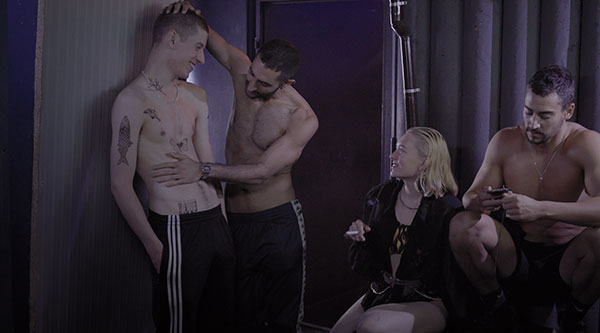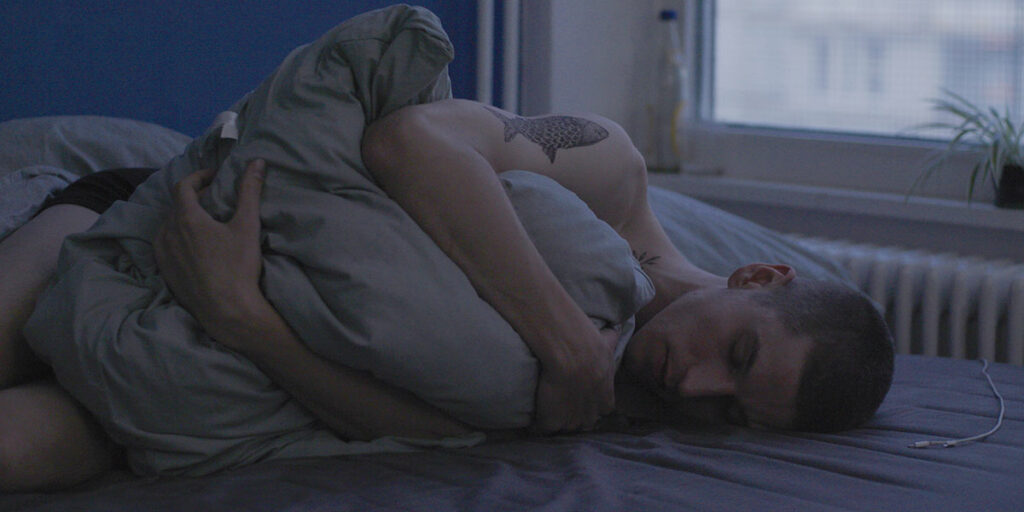Through the haunting story of a young man searching for himself, Drifter shows us what it’s like to be a cis white gay man in Berlin at a specific moment in time.
Hannes Hirsch’s Drifter is the story of a 22-year-old boy named Moritz (Lorenz Hochhuth) who moves to Berlin to be with his boyfriend Jonas (Gustav Schmidt). But his life and future soon change when Jonas, who wasn’t hugely committed to their relationship, breaks up with him, and Moritz finds himself on his on, with no projects to keep him occupied, and feeling lost, directionless, and alone. And so, Moritz begins to discover Berlin’s party scene, and to lead a very different kind of life – one that involves taking drugs and forming connections with strangers, and that mainly takes place at night.
If, by this synopsis alone, you think you know exactly what kind of film Drifter is going to be, think again. Writer and director Hannes Hirsch and co-writer River Matzke subvert our expectations from beginning to end, delivering a movie that doesn’t sensationalise its protagonist’s life and prioritises honesty at all times. Drifter carefully selects the moments we get to see, focusing first of all on a young man who’s trying to belong to a community that is not only incredibly diverse, but also scarred by trauma in many different ways. And though there are plenty of loud dancing scenes with irresistible music and bold stylistic choices, Drifter comes alive in its quieter moments, where glances are enough to convey what’s left unsaid and our protagonist simply exists, in a community in flux, searching for his own identity in the midst of it all.
Lorenz Hochhuth is excellent as Drifter‘s protagonist, giving us a character with whom we immediately emphasise and making us emotionally involved in his journey from the very first scene. But the film isn’t just about Moritz: each and every single one of the people he meets are multifaceted, complex characters, coping with their own burdens and expressing themselves in their own way. Moritz’s narcissistic ex-boyfriend Jonas is one of them, as his inability to show real affection is sure to come from a place of fear, but there are many others, and Moritz spends time with all of them, discovering different ways to be a cis white gay man in Berlin.

And so, Moritz meets all kinds of people. There’s the warm and affectionate Noah (Cino Djavid), who could give him something real and safe with his unconventional, loving family and honest approach to life. But Moritz isn’t ready for that yet, and he starts going to the very same clubs where he didn’t want to spend time when he was with Jonas, and taking the same drugs he used to refuse. At first, our protagonist is a fish out of water, but a series of chance encounters turn into friendships, and real connections are made. As all of this happens, the young man never really stops feeling alone, but he also inevitably does find himself in the end, in his own quiet but assured way.
It’s a story that doesn’t really have a beginning or an end, as we only get to experience a short portion of its protagonist’s life, and the choices he’ll make in the future will determine the kind of man he’ll become. But we are also given a snapshot of a community at a very specific moment in time, in a film that defies preconceived notions of masculinity with a protagonist who remains vulnerable at all times – and that vulnerability is his strength, as it allows him to find himself in the end. Unflinchingly honest and hauntingly beautiful, Drifter is a poignant watch that depicts dynamics you’ll recognise and always stays true to its characters, and it will stay with you for a long time after the credits roll.
Drifter premiered at the Berlin Film Festival on February 18-23, 2023. Read our Berlin Film Festival reviews!

